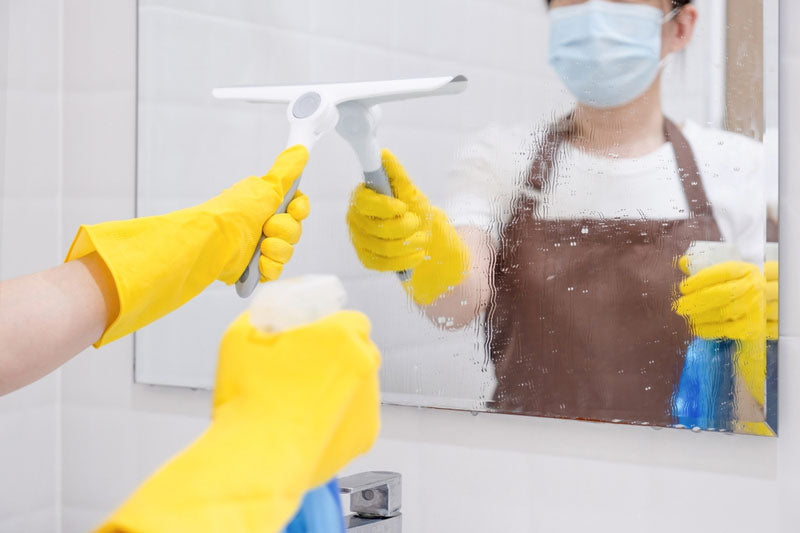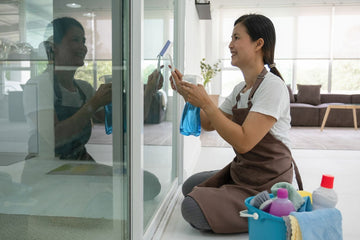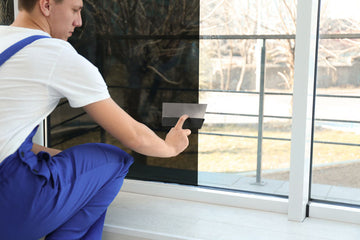Using Alcohol for Window Cleaning
Windows are our portals to the outside world. While soap, sponge, and water in a bucket have traditionally been the go-to tools for keeping our windows squeaky clean, there's a question many homeowners are now asking: "Can you clean windows with alcohol?" This article delves into this alternative cleaning option.
Read more About "Tips for cleaning windows."
The Science Behind Alcohol as a Cleaner
At the heart of it, the reason alcohol – particularly rubbing alcohol – is so efficient at cleaning is because of its ability to break down oils and grime. When you spray alcohol onto a glass surface, it can dissolve these impurities, making it easier to wipe away.
Types of Alcohol
There are two common types of alcohol used for cleaning:
Their cleaning power lies in their quick evaporation rates and disinfectant properties.
Pros of Using Alcohol for Window Cleaning
The following are the pros of using alcohol for cleaning:
- Effectiveness Against Common Stains
- Evaporation and Streak-Free Finish
- Disinfectant Qualities
- Environmental Considerations

Effectiveness Against Common Stains
From the stubborn residue left behind by stickers or tapes to oily handprints, alcohol proves to be a significant adversary. It tackles these stains, leaving your window panes crystal clear.
Evaporation and Streak-Free Finish
One major complaint with many window cleaners is the streaks they leave behind. Alcohol evaporates quickly, reducing the chance of any streaking. For a streak-free shine, try using a squeegee or lint-free cloth, like a newspaper, after applying the solution.
Disinfectant Qualities
Apart from just cleaning, alcohol can kill bacteria, making it an excellent choice for households, especially for those with pets or kids.
Environmental Considerations
Unlike many commercial window cleaners that contain harsh chemicals, alcohol is biodegradable and has a lower impact on waterways.
Affiliate Program
If you love our brand, Earn 20% commission on our affiliate program. Any sale you bring through social get 20%. Reach out to bringitoncleaner07@gmail.com
Cons of Using Alcohol for Window Cleaning
The following are the cons of using alcohol for cleaning:
- Potential Harm to Window Frames
- Safety Concerns
- Possible Degradation of Window Films or Tints
Potential Harm to Window Frames
Whether your frames are made of wood, vinyl, or aluminum, alcohol might cause discoloration or degradation over time. Always ensure the solution doesn't drip onto the sills or ledges.

Safety Concerns
Flammability is a significant concern. Always store alcohol away from open flames. Also, prolonged skin contact or inhalation can be harmful. Make sure you use it in a well-ventilated area. Also must clean your windows to stay healthy.
Possible Degradation of Window Films or Tints
Some specialized window films or tints might not react well with alcohol. Always check labels or seek expert advice before using it.
Cost Compared to Standard Cleaners
While rubbing alcohol is affordable, if you're using it frequently, it might end up being costlier than your regular window cleaner in the long run.
Alternative Natural and Commercial Cleaning Solutions
For those wary of using alcohol, there are other solutions. A popular recipe combines equal parts of water and vinegar in a spray bottle. Another method involves a few drops of dish soap or Bring It On Cleaner product in a bucket of water. Both solutions can be applied using a sponge and wiped off with a lint-free cloth.
Tips for Using Alcohol Safely as a Window Cleaner
- Use the correct dilution ratio, usually 50% alcohol and 50% water, in a spray bottle.
- Protect your hands with gloves.
- Ensure proper ventilation when cleaning indoors.
- Always keep out of reach of children and pets.
Best Practices for Storage and Handling
When it comes to storing rubbing alcohol, ensure it's kept in a cool, dark place away from direct sunlight. The bottle should be sealed tightly. For handling, use a spray bottle for better distribution on the glass surfaces.

Community Comments and Feedback
Several people in the DIY community and on platforms like Instagram and other social media have shared their insights on using alcohol for window cleaning:
"I was skeptical at first, but rubbing alcohol indeed does the job. My mirrors and windows have never been clearer." - Alex J.
"I stick to my trusty vinegar solution, but my neighbor swears by the rubbing alcohol method. To each their own!" - Priya K.
Comparing with Other Products on the Market
There are numerous window cleaning products available, from ammonia-based solutions to those that promise an all-natural clean. It's always crucial to read reviews, understand the ingredients, and determine what fits your household's needs the best.
Conclusion
So, can you clean windows with alcohol? The answer is a resounding yes. While it offers a streak-free shine and powerful cleaning capability, it's essential to weigh the pros and cons. Every home and window is different, and what works for one might not work for another. As always, it's about finding the right solution for your specific needs.




